Scaling Smart: How AI Is Transforming Healthcare IT Investments
AI now drives smarter, scalable healthcare IT investments with global trust-focused adoption.


Artificial intelligence (AI) has become the defining catalyst of Modern Healthcare, reshaping how institutions allocate, optimize, and scale their Healthcare Information Technology (IT) investments. What began as pilot projects in hospital innovation labs has evolved into nationwide deployments across diagnostics, clinical workflows, and hospital operations. From the UK’s £21 million AI Diagnostic Fund to large-scale automation in the U.S. led by UnitedHealth, the message is clear — AI in Healthcare is no longer experimental; it’s infrastructural.
Yet as organizations move from proof-of-concept to production, one key question arises — how do they scale smart without losing reliability and trust?
KPMG: AI's Extensive Adoption in Healthcare. Read more here!
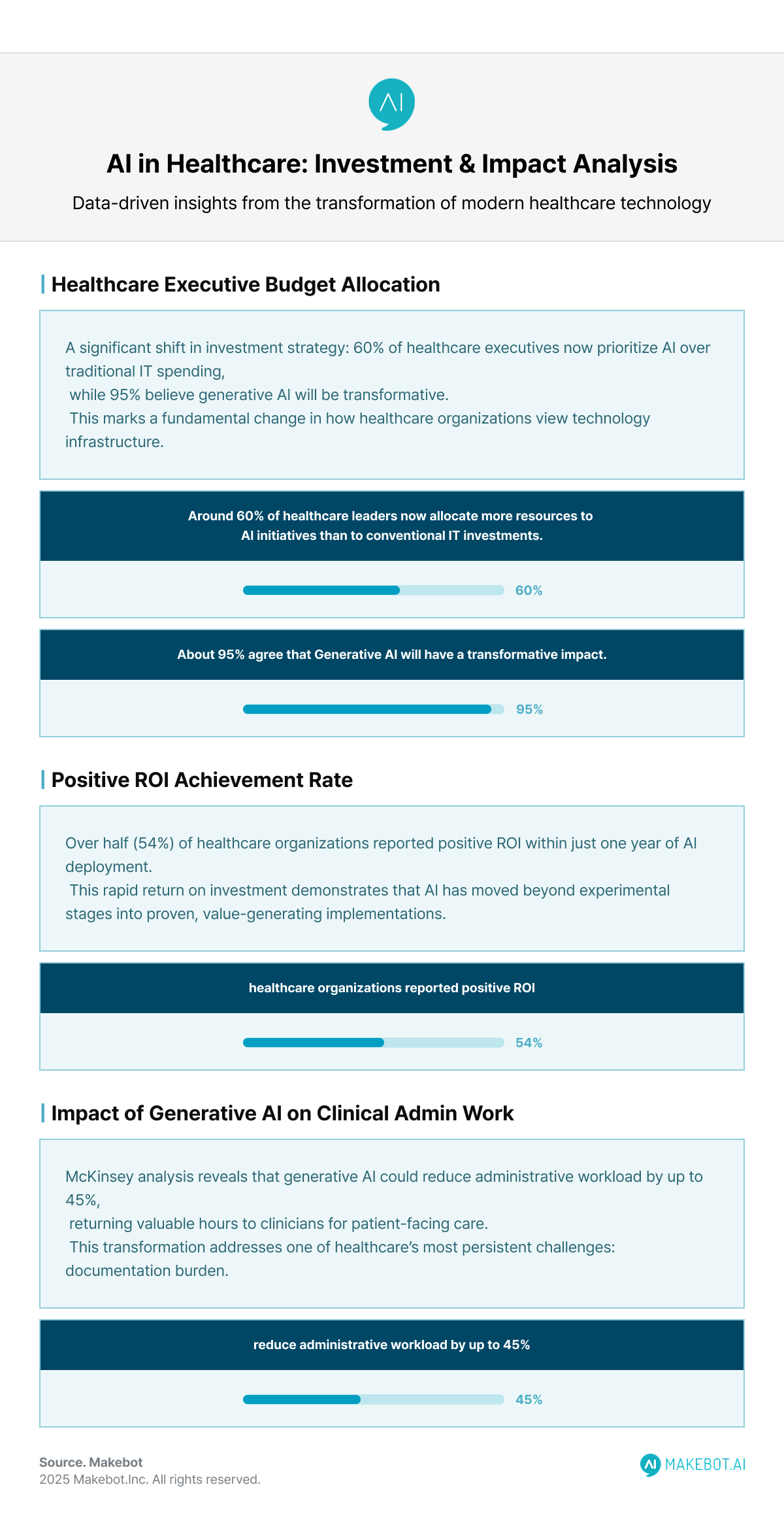
From Pilot to Production: The Maturity Curve of AI in Healthcare
A decade ago, many Healthcare Technology initiatives were plagued by “pilot paralysis,” where proof-of-concepts failed to reach real-world implementation.
According to Forbes, over 90% of enterprise AI pilots once failed to scale, largely due to fragmented data and weak governance. Today, that narrative is shifting toward structured adoption — guided by accountable automation and measurable outcomes.
Recent data from Bain, AWS, and Bessemer Venture Partners show that 60% of healthcare executives now allocate more budget to AI than to traditional IT, and 95% believe Generative AI will be transformative. Even more promising, 54% have already reported positive ROI within a year of deployment, signaling that healthcare’s AI wave is maturing beyond experimentation.
This growing maturity sets the stage for the next evolution — using Generative AI to boost clinical efficiency and ease operational bottlenecks.
Generative AI and the New Era of Clinical Efficiency
Within hospitals, Generative AI is proving to be more than a buzzword — it’s reshaping clinical documentation, communication, and care coordination. Hospitals across the NHS are testing AI models that automatically draft discharge summaries, patient instructions, and physician notes.
McKinsey’s analysis suggests this could reduce administrative workload by up to 45%, giving clinicians back valuable hours for patient-facing care.
Moreover, Healthcare Management teams are discovering that generative systems trained on localized EHR data can enhance compliance and maintain accuracy while supporting multilingual patient communication. This shift illustrates how AI in Healthcare is not replacing expertise but amplifying it — enabling staff to focus on empathy, not paperwork.
As AI efficiency gains momentum, investment strategies are evolving to support scalable, interoperable, and future-ready infrastructure.
Investment Drivers: AI as the Core of Healthcare Infrastructure
Healthcare investors and CIOs are rethinking priorities — moving budgets toward AI solutions that strengthen system capacity and long-term resilience. Across the Healthcare Technology ecosystem, three drivers stand out:
- Operational Automation: UnitedHealth’s Optum Real platform, powered by machine learning, has accelerated claim processing from weeks to hours, reducing medical denials and administrative waste.
- Predictive Analytics: In NHS pilots, AI models predict diabetes or heart disease risk a decade before symptoms arise, optimizing resource allocation for preventive care.
- Workforce Augmentation: Facing a 30% radiology shortfall, the UK healthcare system is turning to AI triage tools like Annalise.ai to prioritize critical scans and free clinician time.
These investments reveal that AI is not merely a budget line — it’s a strategic enabler of sustainable growth and patient satisfaction. However, as systems scale, the foundation of trust and data governance becomes increasingly critical — leading us to the next pillar of success.
How Claude AI Is Transforming Clinical Research and Healthcare Innovation. Read here!
Data Governance and the Rise of Accountable Automation
In today’s digital hospitals, governance defines growth. The world’s most successful AI projects balance speed with accountability — ensuring that Healthcare Information Technology systems remain explainable, ethical, and secure. Qlik’s AI Trust Score has emerged as a benchmark framework, assessing datasets for diversity, timeliness, and accuracy before any AI deployment begins.
This approach — called accountable automation — is redefining Healthcare Management. By keeping a “human in the loop,” hospitals ensure transparency in every algorithmic decision, from triage assessments to claim validations. The winning organizations are not those that deploy the most AI models, but those that build trustworthy ones.
That trust-centric mindset is now scaling globally, fueling a new wave of international healthcare investments in AI-driven ecosystems.

Global Trends: Scaling AI Beyond Borders
Across continents, the AI transformation is accelerating. The UK’s digital health market alone is projected to hit $37.6 billion by 2033, driven by investments in imaging, robotics, and cybersecurity. Meanwhile, in the U.S., UnitedHealth has deployed over 1,000 active AI applications, spanning administrative bots to predictive care analytics.
These milestones mark a clear global shift — from isolated pilots to fully networked, data-driven ecosystems. Cloud providers, healthcare startups, and government programs now collaborate to design scalable frameworks that make AI deployment safe and interoperable.
Such global movement sets the foundation for the final and most strategic layer — ensuring AI investments deliver measurable, long-term value.
The Future of Healthcare Investment: AI as a Capital Multiplier
AI has become a capital multiplier for Modern Healthcare, enabling faster returns on technology spending while improving patient outcomes. Study forecasts that integrated AI systems can cut operational costs by up to 30% by 2030, especially in large hospitals. From predictive staffing to virtual ward monitoring, each implementation compounds its ROI through improved throughput and reduced errors.
However, to scale smartly, leaders must emphasize ethical frameworks, interoperability, and continuous clinician training. AI is not a “plug-and-play” solution — it’s a strategic evolution. Health systems that invest in explainable, compliant, and human-centered AI will be those that sustain innovation beyond hype cycles.
This brings us full circle to the new standard in AI in Healthcare — one defined not by speed, but by sustainable transformation.
Showcasing Korea’s AI Innovation: Makebot’s HybridRAG Framework Presented at SIGIR 2025 in Italy. More here!
Building a Smarter, Sustainable Healthcare Future
The rise of Generative AI and predictive automation marks a new chapter in Healthcare Technology — one where efficiency and empathy converge. Yet the secret to success lies not in adopting every new model, but in scaling smart: ensuring that every deployment is governed, ethical, and clinically validated.
Healthcare Information Technology investments that embody transparency, interoperability, and measurable outcomes will define the next decade of Modern Healthcare. In the race to innovate, the most successful organizations will not be those that build the most AI — but those that build it responsibly, transforming care from the inside out.
Makebot: Turning AI Healthcare Vision into Scalable Reality
As hospitals and health systems race to modernize their Healthcare Information Technology, Makebot bridges the gap between innovation and implementation. We go beyond generic AI delivery — providing industry-specific LLM agents and end-to-end healthcare AI solutions that align with your strategic goals. From hospital-grade data governance to real-time patient engagement, Makebot empowers institutions to scale AI in Healthcare with confidence and compliance.
Whether you’re upgrading your existing system or launching new Healthcare Technology initiatives, Makebot offers a suite of ready-to-deploy tools — BotGrade, MagicTalk, MagicSearch, and MagicVoice — all powered by our globally recognized HybridRAG framework. Trusted by over 1,000 enterprises and leading hospitals such as Seoul National University Hospital and Gangnam Severance Hospital, we help healthcare leaders move from pilot to production — safely, efficiently, and at scale.
👉 Start your AI transformation today at www.makebot.ai
📩 Contact us at b2b@makebot.ai to lead the future of intelligent healthcare.





.jpg)

.png)
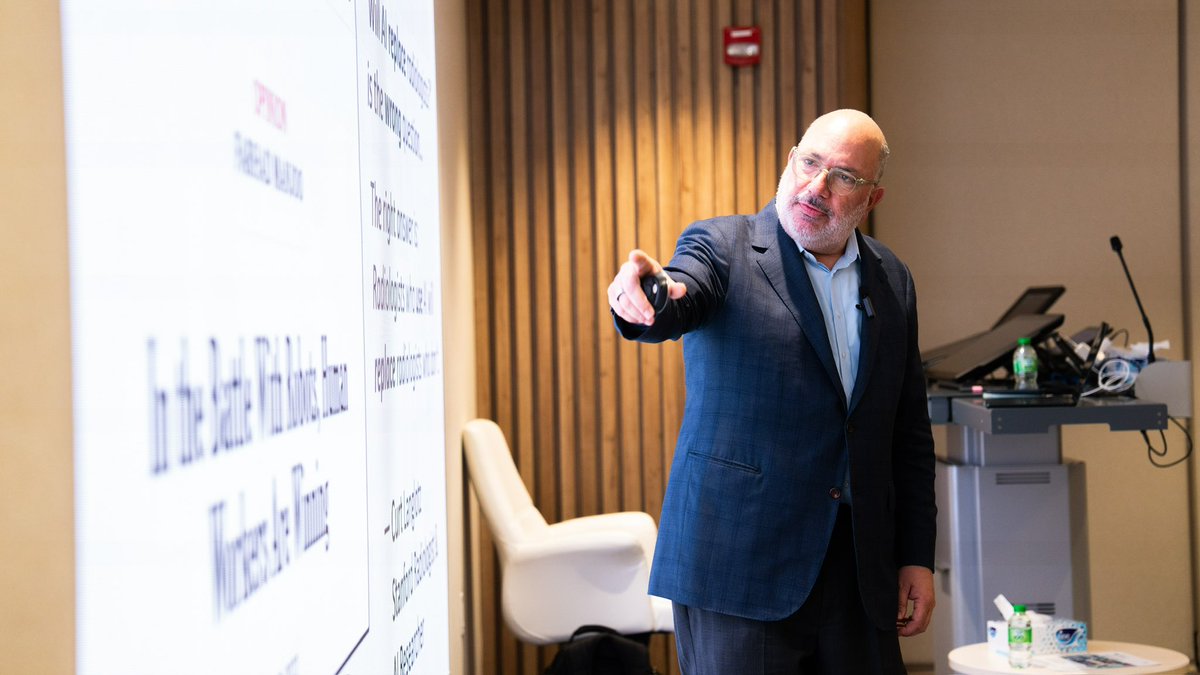





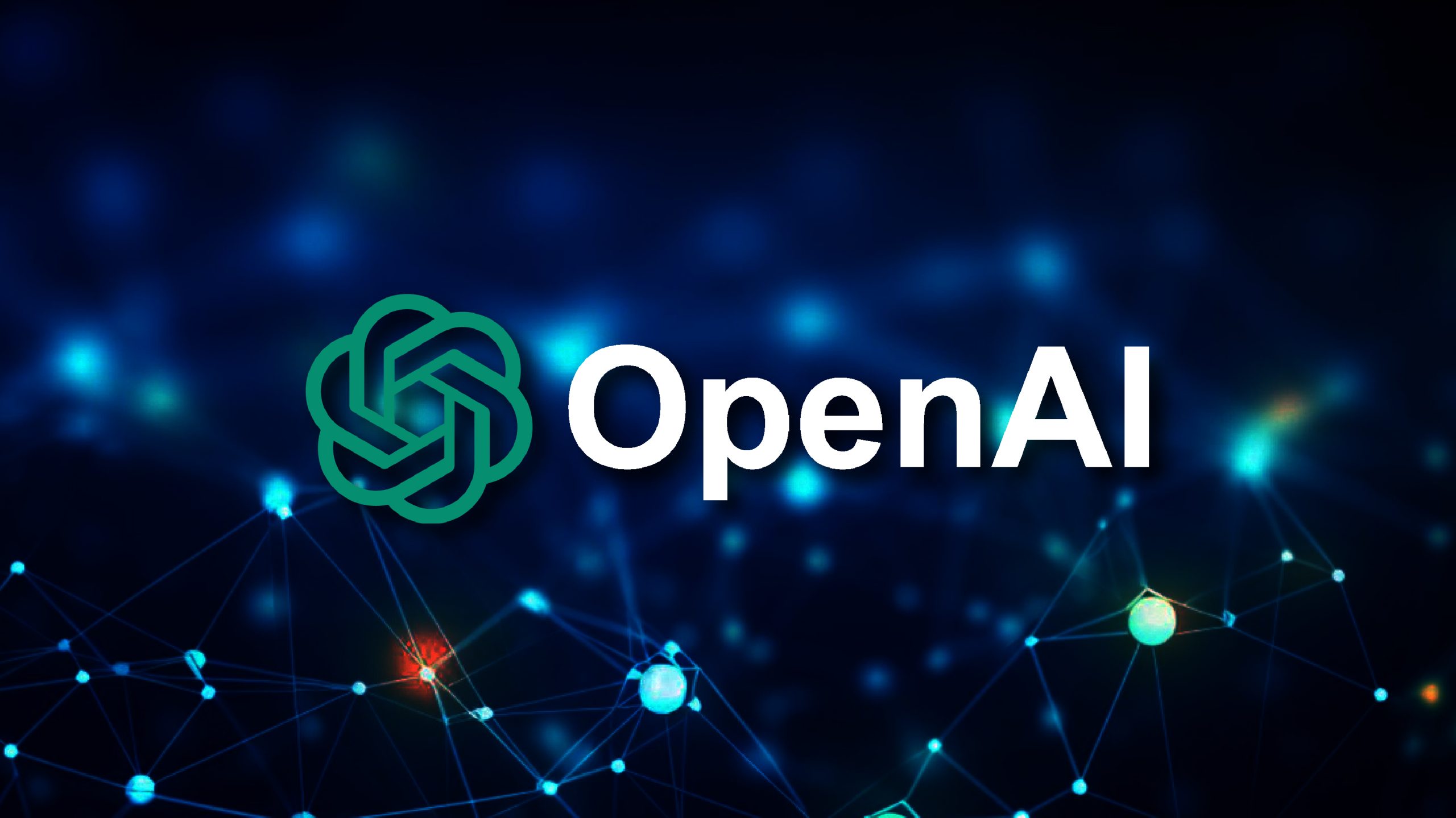



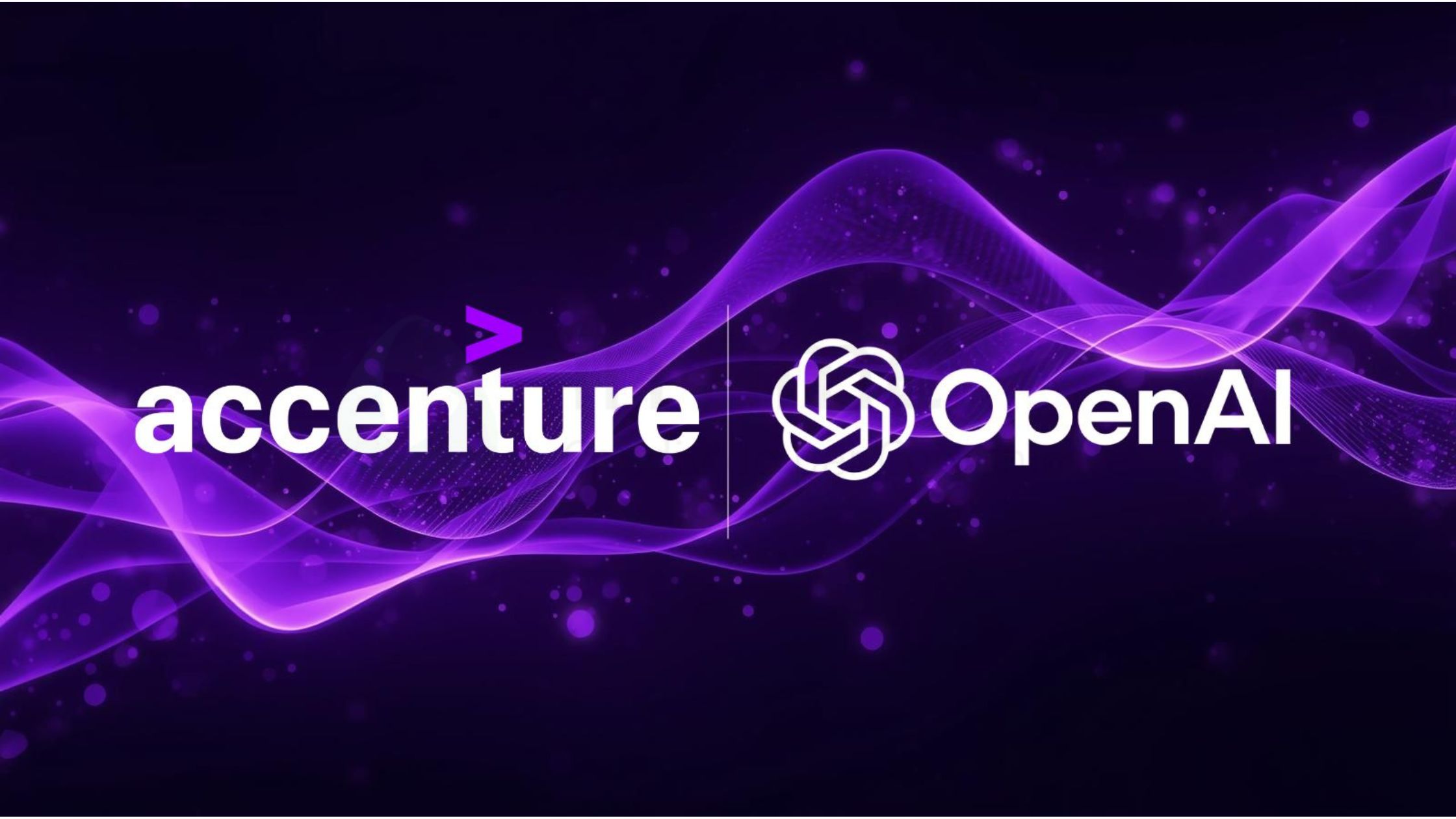































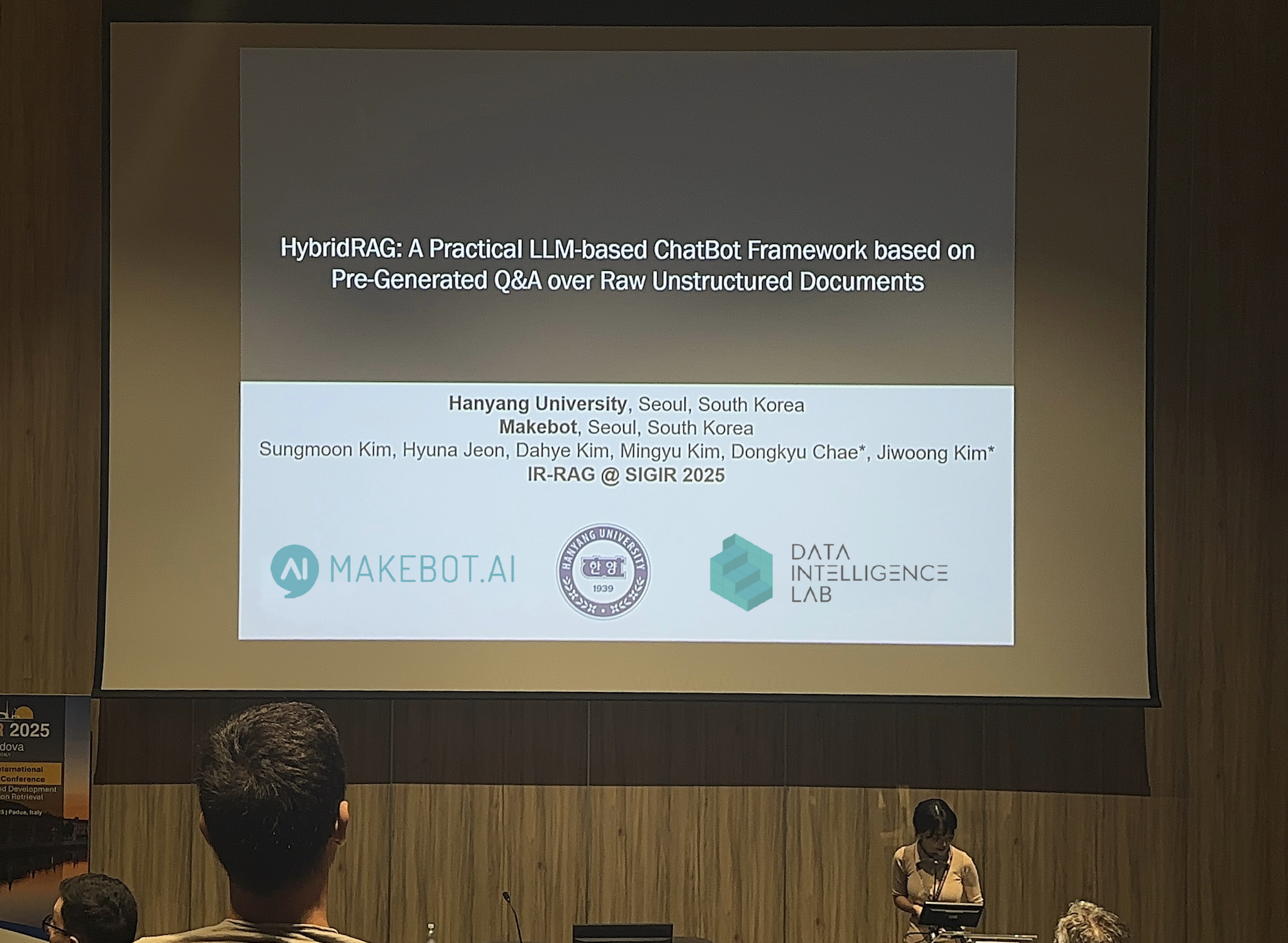









_2.png)


















.jpg)



















